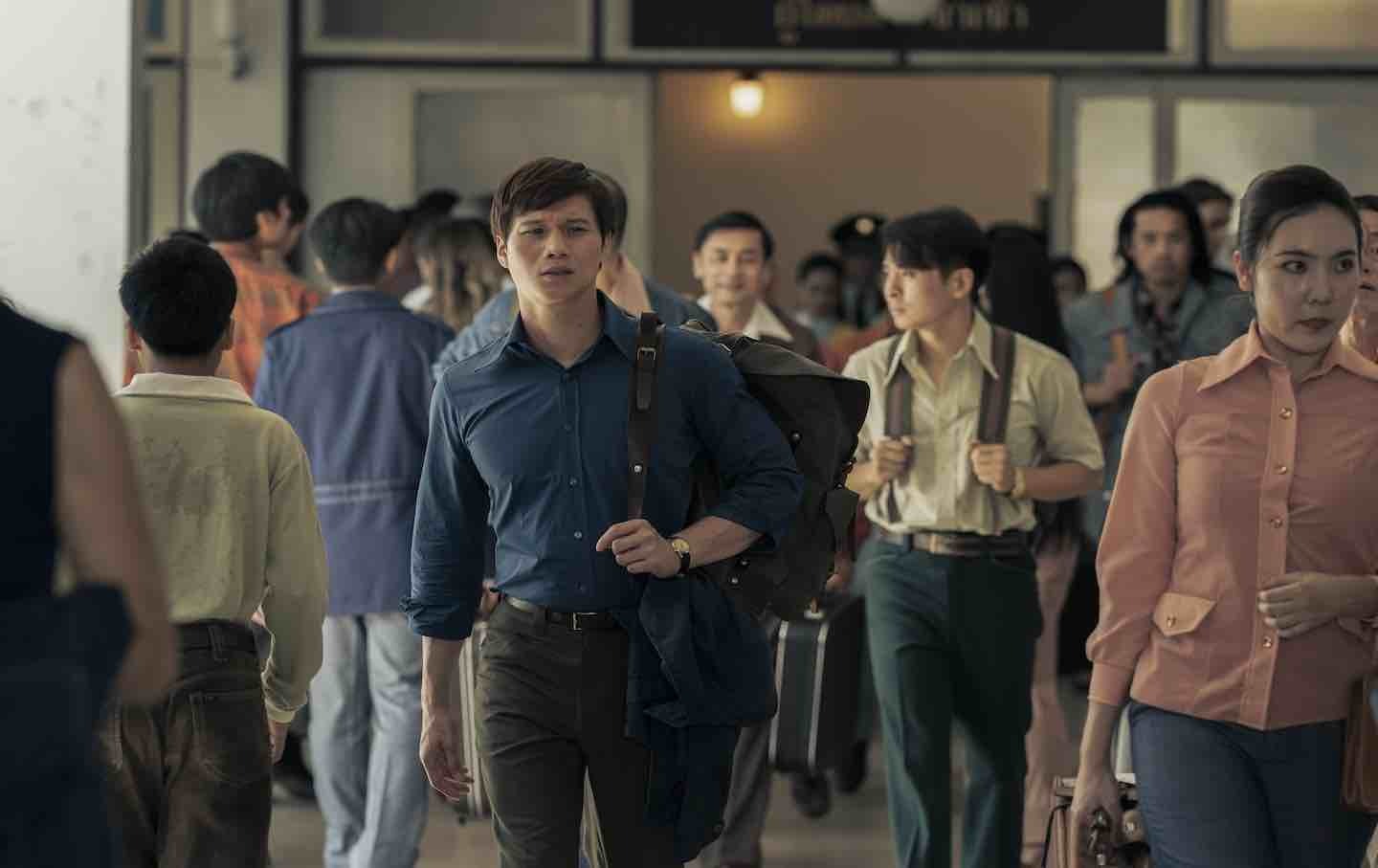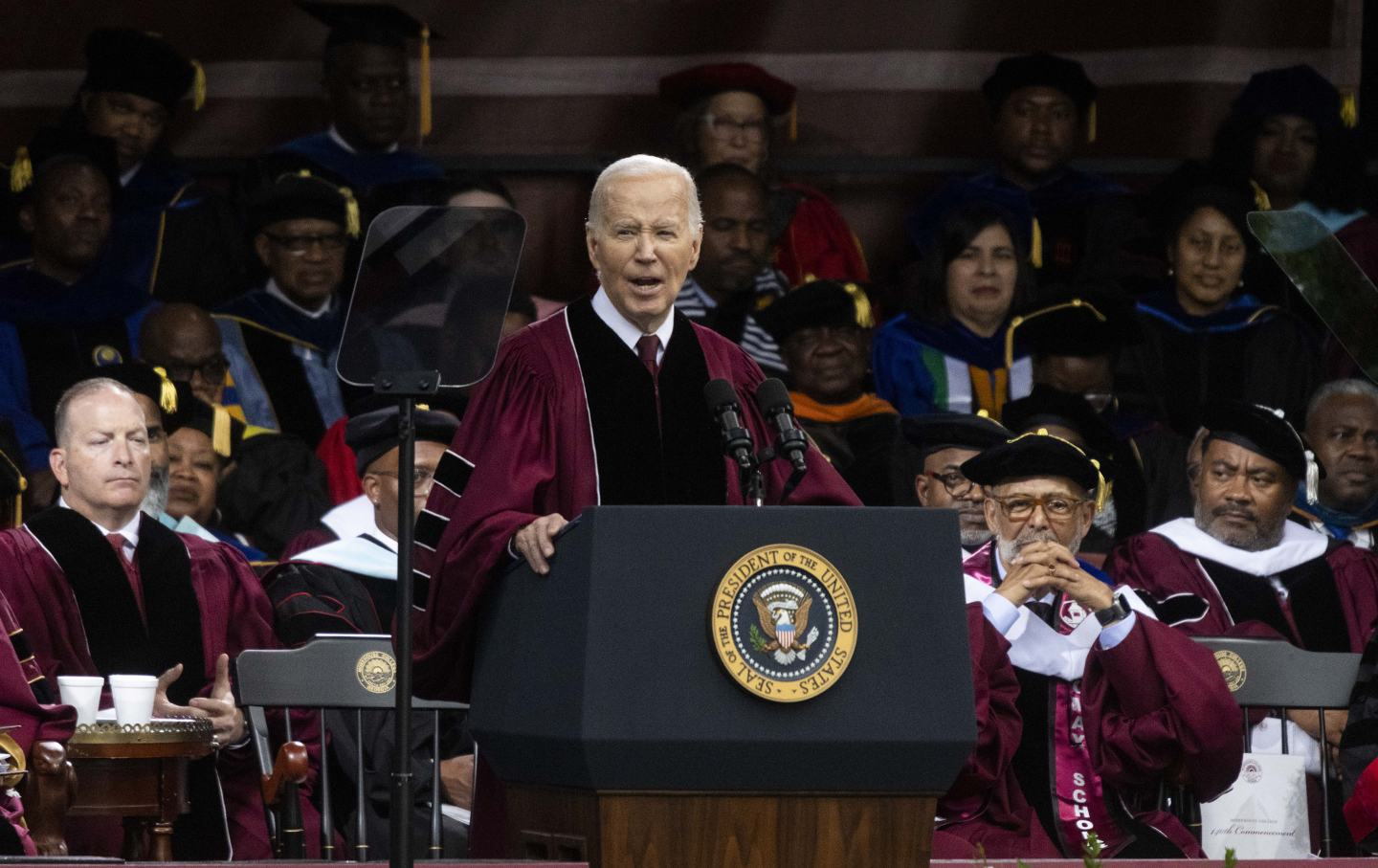
Culture
/
Books & the Arts
/
May 21, 2024
The adaptation of Viet Thanh Nguyen’s novel is a study of migration—between identities and countries and also between different historical periods and genres.
HBO’s The Sympathizer is a confession. We meet the confessor, narrator, and protagonist (played by Hoa Xuande) in a makeshift prison camp in Vietnam. Reading his confession, his interrogator plays the critic, saying, “Rewrite… and this time remember everything.” Our hero goes back to solitary confinement and the loneliness of the writer’s desk. He starts over again. His first words are: “I am a spy, a sleeper, a spook, a man of two faces.” The camera dips down in front of the prisoner, and then we cut to the gigantic face of Charles Bronson, hoisted onto the marquee of a movie palace in Saigon, taking us back to an earlier and vastly different Vietnam.
This matching shot is not merely a graphic lubricant, propelling us through time and space, but also an example of the very juxtaposition that is at The Sympathizer’s core. Adapted from Viet Thanh Nguyen’s Pulitzer Prize–winning novel, it’s the story of a man caught between worlds. The unnamed protagonist is a double agent: a captain in the US-backed secret police of South Vietnam as well as a mole for the Northern communists. The story we see is his retelling of his life, and though he speaks to us in the intimate tones of a noir detective, he is also writing from a reeducation camp in communist Vietnam. His words are a self-justification and, whether he realizes it or not, a story about the loss of home.
Displacement is at the center of The Sympathizer, which means that the show’s center is always in flux. Charles Bronson’s head is our first introduction to the looming presence of the United States. It’s promotional material for a movie and for a culture and a way of life. But it’s flat and two-dimensional, artificial and without substance, and as the narrator is pushed to embrace his fascination with the United States, the same dream is also constantly reduced to hollow signifiers—a box of candies, a bottle of Coca-Cola. Our confessor’s homes are always in dispute. He is not Vietnamese enough in Saigon, but not American enough in Los Angeles.
Our narrator’s splintered consciousness feeds into The Sympathizer’s almost anxious jumps across time and space. The first two episodes in particular bristle with ideas, exposition, rationalizations, all moving backward and forward at a hectic pace, connected only by images and memory. Park Chan-wook, who created the series with Don McKellar and directed the first three episodes, is a master of transition, and his fingerprints are all over the show’s match cuts, the way it barrels into scenes at full speed, and the constant tension between foreground and background. So much of The Sympathizer is always insisting on our attention.
Current Issue

From the present, we are transported back to the year 1975, when the war in Vietnam between North and South—and, as in so many parts of the world, between communism and capitalism—is being decided. Our narrator, the Captain, works as an aide for the General, the head of the South Vietnamese secret police. He is the General’s speechwriter, English teacher, and chauffeur, but he is also a spy, embedded with the enemy and sending coded messages back to his communist handlers. He never tells us how he fell into this kind of work; his ideological commitments are simply treated as an established fact. His most important mission seems to be avoiding suspicion and ensuring his own survival.
The Captain proves very good at the latter, even when it comes with a cost. His conscience haunts him more than any actual enemies. When the South Vietnamese intelligence agents stage a communist spy’s interrogation as an entertainment for the General and his CIA handler, Claude (one of Robert Downey Jr.’s many characters in the series), the Captain fears that she will reveal him as the source of her information. He sheds a tear as the agent is tortured, but like the rest of his moral scruples, it remains private.
As the official end of “the American War”—or what Americans call the Vietnam War—approaches, our hero is pushed to follow the General to the United States. There, he will continue his work as a spy. Nguyen has written, “All wars are fought twice, the first time on the battlefield, the second time in memory.” And as the Captain settles in Los Angeles, The Sympathizer settles into the story of this second war: the war over a home that exists only in memory.
A war is not an event but a structuring frame in which loss destabilizes people’s sense of identity, politics, and community. It’s a destabilization that reverberates in memory and makes itself present and visceral as a sensory experience. Even when it ends, it doesn’t end. While history is in some sense the struggle over official memory, distance tends to simplify the messiness of those memories.
The Sympathizer’s voice-over narration continually reminds us that we are watching an imperfect retelling. The Captain gets ahead of himself, has to double back and re-explain. An image transports him to a painful memory. We jump from location to location freely: the reeducation camp in Vietnam; Saigon before the fall and then torn by war; the open vistas of Oklahoma; a university in Los Angeles, a shitty apartment in the same city, a liquor store under the Hollywood sign; Fort Chaffee in Arkansas, where thousands of refugees wait to be processed; Vietnam again, years earlier, when the Captain and his two blood brothers were scarcely teenagers.
Foreground and background vie for our attention. In one scene, our hero talks to Man, his friend and communist handler, who tells him that he must flee with the General and continue in his role as a spy. Our hero is processing the loss that such an action would entail, but as they talk, an elaborate bar fight unfolds behind them, as their friend Bon single-handedly takes on three Marines. In a later episode, a young journalist in the United States interviews the Captain, who toys with the American’s naïve attempts at solidarity while enjoying the more exciting action behind him, as an older woman takes notice of the handsome, newly arrived refugee.
That woman is Ms. Mori, an administrator at the Department of Oriental Studies of a fictionalized Occidental College. She’s Japanese American but has no interest in playing along with the oriental fantasies of her white department chair, Professor Hammer, by whose whims the Captain has been plucked from Fort Chaffee earlier than the other refugees. Our protagonist is caught between allegiances—between North and South Vietnam, but also between the General and Claude and Professor Hammer, all of whom see him as a potential asset in their own plans. Ms. Mori tells the Captain that he has a way of smiling and nodding that makes everyone feel as if he agrees with whatever they’re saying. He survives by acquiescing.
The Sympathizer is a catalog of all the forms of belonging that are provisional, contingent, or even denied. It is about being a migrant in the way that Stuart Hall described when he wrote that every migrant faces two questions: “Why are you here?” and “When are you going back home?” And it is only upon hearing the second question that the migrant realizes “that really, in the deep sense, she/he’s never going back. Migration is a one way trip.” The Sympathizer is about the impossibility of that return. You turn and expect to see where you came from, but the path is always dissolving behind you. You turn and don’t recognize what you see. And you, in turn, are misrecognized.
Once the Captain lands in California, the series’s focus on exclusion is thrown into a higher gear of complexity. Almost everywhere he goes, he is treated as a tool or, failing that, an interloper. Lest you think him blameless, the Captain is continually abdicating the responsibility for his own actions, attributing them to other people’s desires. Under the alibi of self-preservation, he deflects, accuses others, and even kills.
Xuande’s character is not the only one caught between multiple roles. In the series, Downey is credited with four different characters, a casting tactic that connects the ecosystem of America’s power from the CIA to the academy but also shows the refracted multiplicities of American chauvinism—from imperial agent to orientalizing professor.
Popular
“swipe left below to view more authors”Swipe →
At a time when TV production is becoming more conservative and moving more and more to second-screen status, The Sympathizer pushes the limits of the overcrowded TV screen. Even when the nuances of the Captain’s situation flit by too quickly, the show succeeds in a tonal and temporal dexterity, a gift from Nguyen’s novel as well as the skill of Park’s directing. But the series is also a testament to the merits of trusting your audience: It is confident not only in its storytelling but also in the ability of its viewers to navigate the shifts between satire, spy thriller, political intrigue, and moral introspection.
If there’s a fault with the series, it’s unclear whether the coded messages that the Captain sends back home amount to anything at all. Whether due to the nature of the story (there’s way more plot to set in motion early on, as well as more location changes), or to the fact that the show’s other directors are not named Park Chan-wook, the series eventually sputters rather than speeding ahead. The Sympathizer also expends its stores of pathos too early—or maybe it’s a deliberate consequence of the series fully committing to its satire about a spy who loses our sympathies.
Either way, The Sympathizer succeeds on its own terms. It is a story about migration—the transitions between contexts, identities, and loyalties, between different historical periods and different registers and genres. Our hero is a spy in every setting, which means that he is never quite at home: He is always in a state of movement, always migrating to the next place. By the end, it’s not clear whether the coded messages that the Captain sends back home are even being received—but that, too, is beside the point. The larger question is whether he will learn what Stuart Hall taught us: “There is no ‘home’ to go back to. There never was.”
Thank you for reading The Nation!
We hope you enjoyed the story you just read, just one of the many incisive, deeply reported articles we publish daily. Now more than ever, we need fearless journalism that moves the needle on important issues, uncovers malfeasance and corruption, and uplifts voices and perspectives that often go unheard in mainstream media.
Donate right now and help us hold the powerful accountable, shine a light on issues that would otherwise be swept under the rug, and build a more just and equitable future.
For nearly 160 years, The Nation has stood for truth, justice, and moral clarity. As a reader-supported publication, we are not beholden to the whims of advertisers or a corporate owner. But it does take financial resources to report on stories that may take weeks or months to investigate, thoroughly edit and fact-check articles, and get our stories to readers like you.
Donate today and stand with us for a better future. Thank you for being a supporter of independent journalism.
Thank you for your generosity.
More from The Nation

The real danger posed by the Gaza solidarity encampments is their attack on unfettered autocratic governance by university administrations and wealthy benefactors.
Kevin Young

By ignoring the horrors in Gaza, our healthcare elites are adding to a shameful historical record of denialism.
Eric Reinhart and Mary T. Bassett

Biden’s speech wasn’t groundbreaking. But he did not take these talented 20-somethings for granted.
Joan Walsh

The Supreme Court justice had an upside-down flag flying at his home, in an apparent reference to the “Stop the Steal” campaign.
Chris Lehmann

The ICC prosecutor’s decision to seek arrest warrants against Israeli leaders puts it beyond doubt: It’s time to cut off the weapons.
John Nichols